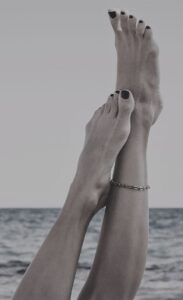Venous eczema, or vevous stasis dermatitis, is a skin condition that affects your lower legs. Causing symptoms like swelling, itching, changes in skin color and even ulcers, the condition is linked to poor circulation. Today, we'll explore how you can diagnose, treat or prevent this chronic form of eczema.

This skin condition develops when you have malfunctioning vein valves. With this kind of vein disease, blood flows backward (we call this reflux) and builds up in your lower legs. In turn, you may develop swelling (edema), as well as other symptoms of vein disease, including eczema.
Anyone with vein health issues may develop this skin condition, but certain factors increase your risk. These include:
CVI increases your risk for venous eczema. This is a serious condition, characterized by malfunctioning vein valves. And it affects about 40% of Americans. Learn more about CVI here.
If your lymphatic system isn't working well, you can develop swelling in one or more areas of your body, caused by built-up lymph fluid.
In addition to CVI and lymphedema, your venous eczema risk will increase if your blood pressure is too high or if you have varicose veins. Carrying extra weight or spending too much time standing or sitting is also a concern. Having a history of blood clots, especially in your legs, is also a risk factor. And conditions including pregnancy, as well as heart and kidney failure, can also contribute to this condition.
With this skin condition, you may experience itching, swelling, pain and inflammation. Sores or ulcers can form on your legs, and your skin may also change colors. Tight, tender and scaly skin could be a sign of this form of dermatitis, and varicose veins are also a symptom.
If you have symptoms of this kind of eczema, a physical exam can help with diagnosis. You may also need a diagnostic ultrasound to make sure you haven't formed a blood clot. Additionally, we may measure your circulation and relative blood pressure with an ankle-brachial pressure index (ABPI) test. This test helps us detect peripheral arterial disease (PAD), and can give us a better understanding of the blood flow in your lower legs.
If you have venous eczema, we can help manage symptoms and prevent complications by treating your venous insufficiency. We will also need to treat any signs of edema in order to prevent complications. And we can do that by offering compression therapy, getting you walking, and focusing on strengthening your calf muscles. If you've already developed ulcers or skin infections, you may also need prescription medications.
Unfortunately, this is a chronic disease. So, while we can't offer you a cure, we can provide important support to manage your symptoms and prevent complications. Seeking early treatment is crucial because this form of eczema increases your risk for ulcers, thickened skin, and permanent skin color changes.
Getting your veins into optimal working order can help prevent vein disease, and venous eczema. Some of the best choices you can make for your vein health include moving regularly, to avoid long periods of sitting or standing. You should also avoid wearing tight clothing, get regular exercise, and keep your legs elevated whenever you can, but especially at the end of a long day on your feet. Staying hydrated and following a vein-friendly diet can also help with prevention. And, most importantly, reach out for an immediate appointment at the first sign of any symptoms of venous eczema. Early intervention is the key to preventing serious complications.

Scheduling
Please contact our dedicated specialists to schedule a consultation today.
2025 Texas Endovascular. All rights reserved. Website Design by Healthcare Success